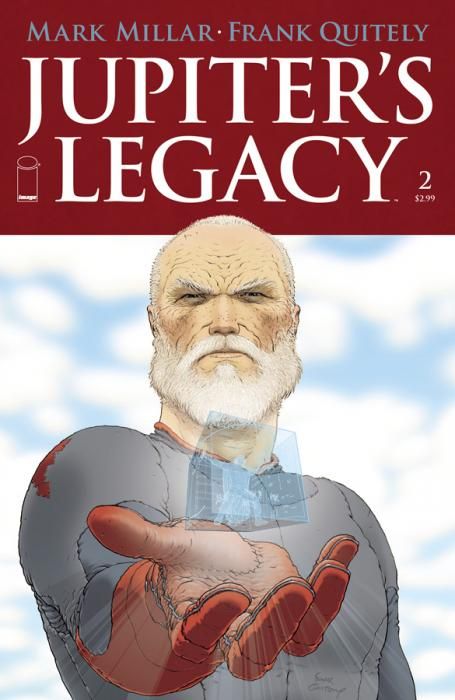"Jupiter's Legacy" #2 continues the generational superhero epic by Mark Millar and Frank Quitely, as the aging Utopian clashes with his relatives (young and old) while attempting to make the world a better place.
The second issue of the story seems to make it clear where the series is headed, and while it seems to be following a simple trajectory, it's one which is easy to engage with. You can see parallels being drawn between this story and Greek/Roman tragedies, and given the story's title, those connections are doubtlessly anything but accidental. Luckily, if it seems like the plots are recycled, there's no need to worry -- Millar's trademark social satire makes it feel, by degrees, modern and timely in ways that similar stories have actively avoided.
Interestingly, it's hard to get a bead on how the story sides with its characters. The conservative (with a lowercase c) Utopian is a Superman analogue, preferring to intervene reactively and lead by example. Characters criticise him as old-fashioned and out of touch, but he's the only one in the series whose motives seem broadly pure. The Utopian's brother, Walter, is presented as more actively political and less naive, but he's also clearly self-interested and scheming. The children may be screw-ups, but the blame for that is placed, at least in part, at the Utopian's feet. In presenting such a well-rounded and well-realized cast, Millar's oft-criticised cynicism appears to have been dialled right back and the story is all the more successful for it.
It probably helps that Quitely's art is so openly beautiful. He's one of the definitive superhero artists of all time, and there's more than a touch of "All Star Superman's" lightness in this story. Sadly, there are two ironies in the art: despite its light tone, the colouring is muddy and muted, obscuring the details. Also, the colouring shows all the hallmarks of digital work that hasn't been corrected for printing on paper -- but on a book with a delayed digital release. It could look so much better than it does. When viewed on a screen, it probably will.
Still, that's mainly a production complaint. The story itself is good, and after a fairly slow first issue spent establishing the world and characters, the second issue sees its various plots start to move quickly and definitively. It's too early to say whether this is "the greatest superhero epic of this generation" as "Jupiter's Legacy's" back cover asserts, but it's certainly on the right track, and if nothing else, it feels like an interesting thematic companion to "Kick Ass" in the way it deconstructs the idea of a superhero. Perhaps Millar has a new point to make in that well-worn arena, perhaps not, but after two issues this good, he probably deserves the benefit of the doubt.

